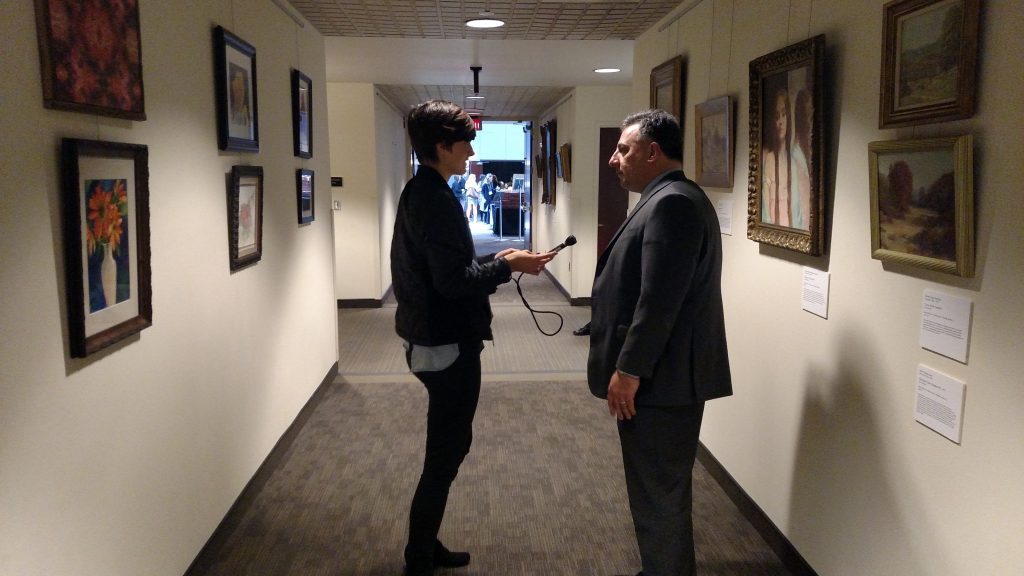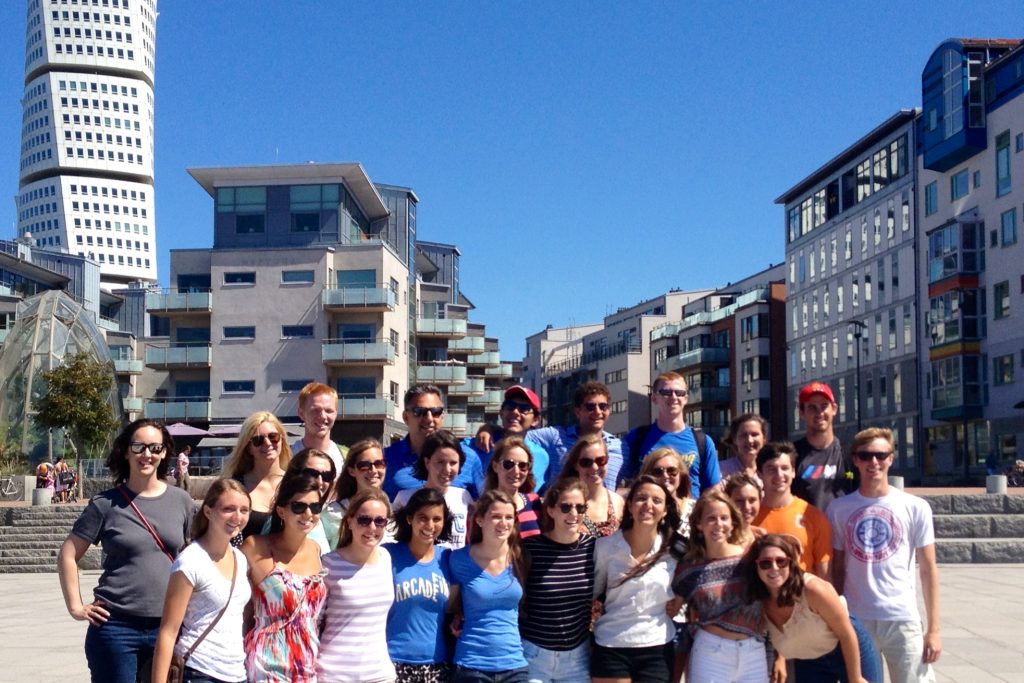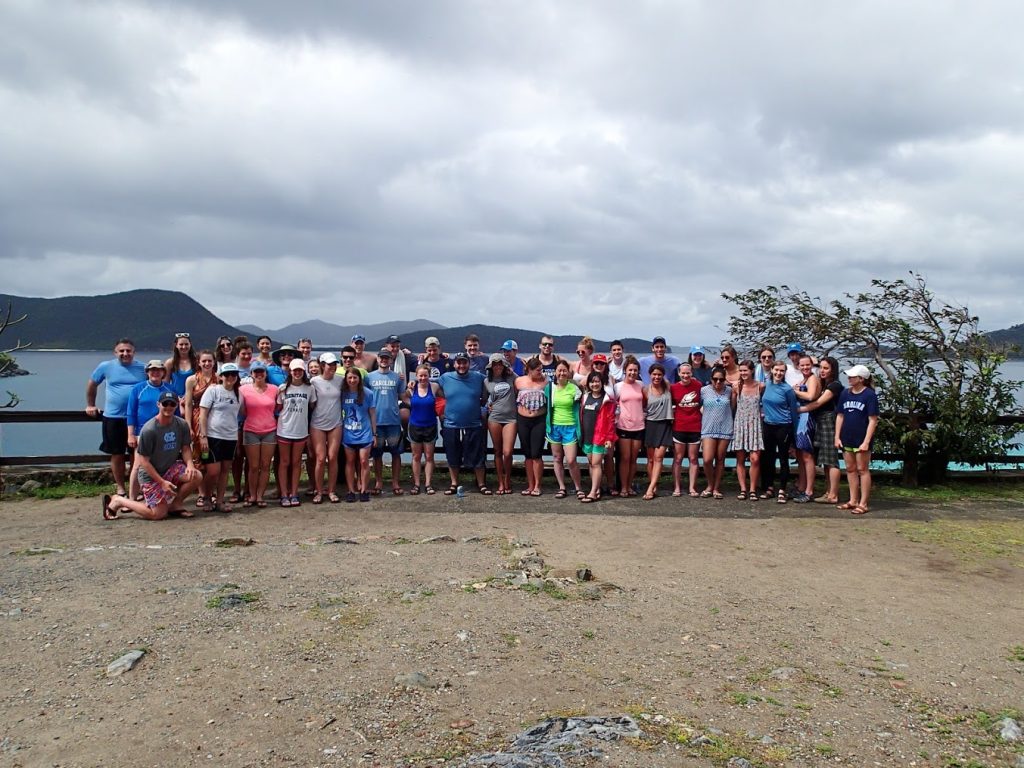‘Time to teach solutions to pressing environmental challenges,’ says Gangi
November 30, 2016
Gangi takes a break from the 2016 UNC Clean Tech Summit to take an interview with student media.
Greg Gangi, a joint faculty member in the Institute for the Environment (IE) and the Curriculum in Environment and Ecology, and the associate director of education for IE, said it is time to stop focusing on problems and start searching for solutions when it comes to studying the environment.
Gangi has been an environmental studies professor at UNC-Chapel Hill for 16 years. Prior to teaching he got his Ph.D. in ecology from UNC in 1999.
The students, Gangi said, were his inspiration for evolving his teaching style to be solution-oriented.
“I listen to what students have to say,” Gangi said. “In 2009 I started talking to more and more students during advising who said they weren’t interested in studying problems. They didn’t want to study how fast glaciers were melting or how fast we’re depleting aquifers. They wanted to work on solutions.
“I agreed with students 100 percent. It is not only more fulfilling to work on solutions, but that’s where the jobs are.”
Gangi said after this realization he started using his position on the educational task force to revise what environmental studies does for students.
“I would like to see an office for experiential education established that not only deals with field sites and study abroad, but actually arranges longer internships for students,” Gangi said. “Rather than the typical six to eight week internship, students could take a semester and summer off to do a long internship before they graduate with the idea that if they do a good job, then they will either be employed or get a great reference to get a job in a similar position.”
Experiential education is something Gangi believes is crucial for students’ development.
“You learn so much by doing,” Gangi said. “Not only do you begin to integrate and begin to use skills that you didn’t apply before, but you start to apply what you learn. You also learn about yourself because people have vague ideas about what they might want to do, and until you try them you don’t know.”
Gangi has led various trips that provided students with experiential education opportunities. He has taken students to the Sierra Nevada Mountains, the Galapagos Islands, Siberia, St. John, and on a trip to Germany, Denmark and Sweden.

Gangi said his favorite was when they went to Europe.
“It was so informative. We focused on clean technology, innovation and urban design,” Gangi said. “It just was a real eye opener for everybody, including myself. I knew about it and I read about it, but it’s another thing to be there and meet with policy makers and business leaders and scientists.”
Nico Krachenfels, a junior business and global studies double major, traveled with Gangi to St. John. Krachenfels said the class spent the week snorkeling and studying problems coral reefs in the area faced.
“Gangi is basically a fountain of knowledge and draws from several incredible life experiences to teach his students,” Krachenfels said. “He cares a lot about the students and their futures and is always looking to give helpful career advice. When we were on the beach in St. John, he offered to give academic and career advice to all of the students on the trip. He is genuinely invested in the young generation and wants to equip them will the skills to make an impact on the world.”

An eye-opening experience from his own education, Gangi said, made him realize the importance of studying the environment and providing students with experiential education opportunities.
“Part of it was moving to North Carolina when I was 13 from a really dense urban area and just enjoying the increase in nature that was here,” Gangi said. “Then part of it was an awareness that things were going downhill. A lot of that came from when I was studying in Germany before grad school for three years. Germany and Europe experienced some serious environmental problems like acid rain, Chernobyl and the Sandoz accident on the Rhine river.
“In Europe you had the acid rain problem, the forests were dying in central Europe, I was in Europe when Chernobyl happened, and there were other environmental disasters like the chemical fire at the Sandoz chemical plant in Switzerland that poisoned the entire Rhine River and left it biologically dead for months. You know, that kind of thing really started to open my eyes, and I became much more interested in environment and sustainability.”
Gangi’s interest in the environment and care for students has made him a favorite professor among students and a trusted advisor.
Will Morgan, the director of government relations at the Nature Conservancy, was a student of Gangi’s. Morgan said he went on Gangi’s trip to the Sierra Nevada Mountains during his freshman year at UNC, a time when he was struggling to find his path both academically and personally.

“When I got back from the trip I knew I wanted to major in Environmental Studies, and Greg served as my academic advisor and mentor for my final three years in Chapel Hill,” Morgan said. “ Today I have fulfilling career lobbying on behalf of The Nature Conservancy in Congress and the North Carolina General Assembly, and I wouldn’t be where I am today if Greg hadn’t set me down the right path.”
Gangi’s excellence in teaching and advising has been widely recognized. His awards include the Outstanding Faculty Advising Award from the National Academic Advising Association in 2014; the Tanner Teaching Award in 2010, which is selected by the University Teach Awards Committee; The Order of the Golden Fleece in 2008, the most distinguished honor society at UNC; two Student Undergraduate Teaching Awards in 1998 and 2006, which were selected by UNC students as one of the best undergraduate instructors; three Class of 1996 Awards for Advising Excellence in 2002, 2006 and 2013, awarded annually to one individual at UNC to recognize advising excellence.; and the Mickel-Shaw Excellence in Advising Awards in 2004, awarded annually to a UNC faculty member to recognize advising excellence.

In addition to leading trips for students, Gangi created the UNC Clean Tech Summit, which brings together professionals in business, policy and academia from across the country to discuss the clean tech industry in North Carolina.
“The UNC Clean Tech Summit was about creating opportunities for students with the idea that over time this could become a job fair,” Gangi said. “It was a way for me to grab a megaphone and make people listen. It was also a way to begin to look at new ways in which the university could collaborate with the private sector and government and begin to become a more powerful engine of innovation. “
The Clean Tech Summit demonstrates Gangi’s devotion to refocusing how people learn about the environment.
“I think we’re at a cross point right now,” Gangi said. “What is the environment? What does it mean to study the environment? On the one hand you have traditional people who study ecology and earth system science who feel as though this is what the environment is about and we shouldn’t stretch the box too much. I think its time to reconfigure things. Information science, computer science, math, business, innovative public policy, economics. These are important players in providing solutions to environmental problems. We should strive to help develop more sustainable pathways for economic development
“I think it is time to refigure and not just focus on a narrow environmental box. Rather than be pure and just look at what’s happening to the environment and how that might make us sick or not sick, I’d like to see UNC much more solution based and be focused on the environment, innovation and technology.
